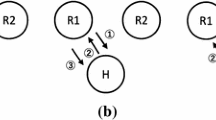Abstract
Communication robots are utilized in various conversational service fields, but it is suggested that there is a psychological barrier for users to interact with robots. In our previous study, we proposed focusing on a task performed during a conversation with a robot to create a conversational environment where the user would be willing to converse with the robot. In this paper, as a continuation of our previous study, we discuss the effects of incorporating a playful task of playing catch during conversations with a robot. Although previous research has shown that introducing a task to play catch effectively supported smooth turn-taking, it was not clear whether this effect was unique to the catch task or whether it was found in tasks that visualize conversational turns in general. Therefore, to verify the impact of the two aspects that the task of playing catch has on the motivation, enjoyment, and smoothness of an interaction with a communication robot, we conducted an experiment to compare it with a case using a simple device that only supports the visualization of turn-taking. Although the effect of improving the motivation to interact cannot be confirmed, we found that the ball exchange in the proposed task contributes to the visualization of the conversation exchange and improves both the smoothness of interaction and the sense of enjoyment for users.
Access this chapter
Tax calculation will be finalised at checkout
Purchases are for personal use only
Similar content being viewed by others
References
Demir, K.A., Döven, G., Sezen, B.: Industry 5.0 and human-robot co-working. Procedia Comput. Sci. 158, 688–695 (2019)
Calo, C.J., Hunt-Bull, N., Lewis, L., Metzler, T.: Ethical implications of using the paro robot, with a focus on dementia patient care. In Workshops at the 25th Conference on Artificial Intelligence AAAI’11, pp.20–24 (2011)
Nomura, T., Kanda, T., Suzuki, T., Kato, K.: Prediction of human behavior in human-robot interaction using psychological scales for anxiety and negative attitudes toward robots. IEEE Trans. Rob. 24(2), 442–451 (2008)
Okafuji, Y., Mitsui, Y., Matsumura, K., Baba, J., Nakanishi, J.: Changes in embarrassment through repeated interactions with robots in public spaces. In 32nd IEEE International Conference on Robot and Human Interactive Communication, RO-MAN’23, pp. 2253–2258. IEEE (2023)
Obo, T., Takizawa, K.: Analysis of timing and effect of visual cue on turn-taking in human-robot interaction. J. Robot. Mechatron. 34(1), 55–63 (2022)
Uchida, T., Minato, T., Ishiguro, H.: Does a conversational robot need to have its own values? A study of dialogue strategy to enhance people’s motivation to use autonomous conversational robots. In: Proceedings of the 4th International Conference on Human Agent Interaction, HAI’16, pp.187–192 (2016)
Tae, M., Lee, J.: The effect of robot’s ice-breaking humor on likeability and future contact intentions. In: Companion of the 2020 ACM/IEEE International Conference on Human-Robot Interaction, HRI’20, pp. 462–464 (2020)
Katsuki, R., Ando, M., Otsu, K., Izumi, T.: Introducing Playing Catch to Motivate Interaction with Communication Robots. In: Kurosu, M., Hashizume, A. (eds.) Human-Computer Interaction: Thematic Area, HCI 2023, Held as Part of the 25th HCI International Conference, HCII 2023, Copenhagen, Denmark, July 23–28, 2023, Proceedings, Part III, pp. 79–91. Springer Nature Switzerland, Cham (2023). https://doi.org/10.1007/978-3-031-35602-5_6
Cooney, M., Kanda, T., Alissandrakis, A., Ishiguro, H.: Designing enjoyable motion-based play interactions with a small humanoid robot. Int. J. Soc. Robot. 6, 173–193 (2014)
Fraser, N.M., Gilbert, G.N.: Simulating speech systems. Comput. Speech Lang. 5(1), 81–99 (1991)
Acknowledgments
This work was supported in part by GMO Internet Foundation, KDDI Foundation, JSPS KAKENHI (Grant Number 22K21096) and Ritsumeikan Global Innovation Research Organization(R-GIRO), Ritsumeikan University.
Author information
Authors and Affiliations
Corresponding author
Editor information
Editors and Affiliations
Rights and permissions
Copyright information
© 2024 The Author(s), under exclusive license to Springer Nature Switzerland AG
About this paper
Cite this paper
Katsuki, R., Ando, M., Otsu, K., Izumi, T. (2024). Exploring the Impact of a Playing Catch Task on the Impression of Interaction with Conversational Robots. In: Kurosu, M., Hashizume, A. (eds) Human-Computer Interaction. HCII 2024. Lecture Notes in Computer Science, vol 14685. Springer, Cham. https://doi.org/10.1007/978-3-031-60412-6_9
Download citation
DOI: https://doi.org/10.1007/978-3-031-60412-6_9
Published:
Publisher Name: Springer, Cham
Print ISBN: 978-3-031-60411-9
Online ISBN: 978-3-031-60412-6
eBook Packages: Computer ScienceComputer Science (R0)




